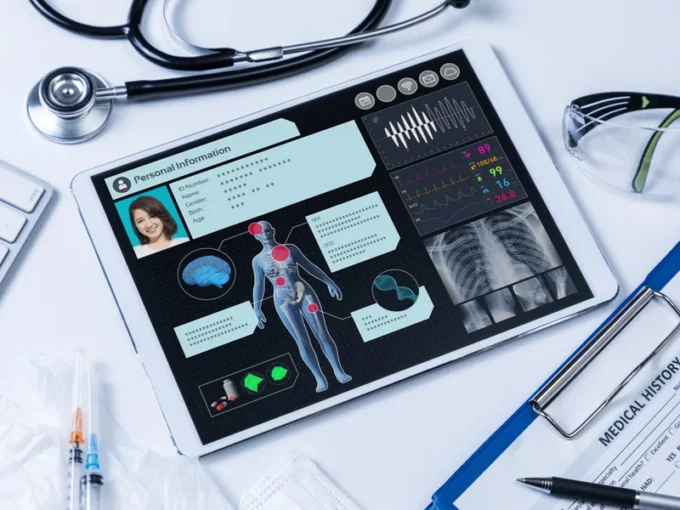As a healthcare professional, you are constantly looking for ways to enhance patient care and streamline your operation. Even though you may have heard about the latest in healthcare provider solutions, you might not know what it is or how exactly it can benefit you.
A wide range of products and services are included under the umbrella term “healthcare technology.” It covers everything, including medical equipment, electronic health records (EHRs), and health IT services. In addition to the constant introduction of new technologies, the healthcare landscape is constantly evolving. Although it can be challenging to stay on top of everything, it is essential to be knowledgeable about the most recent advancements in healthcare technology in order to make wise choices about how to implement it in your practice.
In this blog post, we will provide an overview of the latest healthcare provider solutions.
The State of Technology in the healthcare industry today

Pressure to lower costs while also improving patient outcomes has led to healthcare providers investing more in cutting-edge technology. A rapidly expanding field is telemedicine, which uses technology to connect patients with doctors and other healthcare professionals remotely. This could significantly increase access to care, especially in rural areas. Another promising area is the use of artificial intelligence (AI) in diagnosis and treatment. A few hospitals already employ AI-powered tools, which have a lot of potential advantages.
Overall, healthcare provider solutions is the proven pathway towards improved patient care. With continued advances in this area, we can expect even more improvements in the years to come.
What should healthcare providers be aware of?

Recently, there has been a lot of talk about healthcare and technology. You may be wondering what all the fuss is about and what it means for healthcare providers. In a nutshell, healthcare technology refers to any type of technology that can be used to improve healthcare delivery. This includes electronic health records (EHRs), telehealth solutions, and patient portals.
Healthcare providers must be aware of the various types of healthcare technology that are available and how they can be used to improve patient care. We will provide you with a comprehensive overview of some of the most popular healthcare technology solutions and how they can be used in your practice in this article.
For example, EHRs are one of the most important pieces of healthcare technology. They are capable of storing and managing patient health information
As healthcare providers strive to improve patient care and outcomes, it is essential that they stay up-to-date with the latest healthcare technology. Healthcare providers should be aware of developments such as artificial intelligence, telehealth, and remote patient monitoring. In addition, providers should be familiar with data storage and sharing technologies, as well as payment models and regulations. Healthcare providers must also keep informed about the ethical considerations of using new technologies.
Healthcare providers should be aware of data security and privacy concerns, such as the Health Insurance Portability and Accountability Act (HIPAA). Additionally, healthcare providers should be aware of the potential risk of misdiagnosis and errors due to new technologies. By staying informed, healthcare providers can ensure they are making ethical and safe decisions when utilizing and implementing new healthcare technologies.
The benefits of staying updated with healthcare technology
By staying up-to-date with the latest healthcare technology, providers can
- Improve patient care quality
- Enhance coordination of care
- Improve patient safety
- Reduce medical errors
- Improve provider efficiency
- Reduce healthcare costs
The healthcare industry is always changing, and keeping up with the latest technology can be a challenge. However, there are many other benefits to staying up-to-date with the latest healthcare technology. Staying up-to-date with healthcare technology can help you attract new patients. With the rise of technology and the growing use of the internet, patients are increasingly turning to online sources for information about their health. If you’re able to show that you’re using the latest and greatest healthcare technology, you can attract new patients who are looking for treatment with modern tech
Many healthcare providers are hesitant to embrace new healthcare technology, thinking it will be too expensive or time-consuming to implement. However, there are many benefits that providers can have by keeping up with the latest healthcare technology.
How to keep up to date of advancements in healthcare technology

With the pace of change in the healthcare industry, healthcare providers need to stay informed about the latest healthcare technology. Staying up-to-date requires research and networking, as well as attending conferences and workshops. Healthcare providers should be reading industry publications and articles and subscribing to industry newsletters or podcasts. Additionally, healthcare providers should join online forums and communities to stay informed and connect with other healthcare professionals. By networking with healthcare professionals, providers can get insights into the latest healthcare technology and learn more about how others are using it to improve care. It is also important for healthcare providers to stay up-to-date with legislation, so they can understand how new technology may affect their practice.
Integrating cutting-edge medical technology into your practice
By implementing the latest healthcare technology in your practice, you can improve patient outcomes, reduce errors, and increase efficiency.
Check out the list of the most trending healthcare solutions of this year.

Custom solutions over Cots: By 2024, more and more providers will rely on specialized solutions to assist them in managing the care of their patients. personalized answers to their particular problems. Utilize data analysis to identify your pain points, then look for the best solutions for your particular requirements. This will save expenses for providers while also enhancing the standard of care that patients receive.
Data Analytics: The year 2024 will be all about improving data quantification. Providers will benefit from data analytics since it will enable them to monitor patient outcomes and health in order to make wiser treatment choices. The analysis of data from electronic health records (EHRs) will enable healthcare professionals to observe patient trends and spot possible issues before they arise. By doing so, healthcare professionals will be able to treat patients more effectively and perhaps even foresee or avert larger problems.
Interoperability: Make use of government-approved communication methods and API power to improve services and stop money from leaking out. The need of a seamless data interchange has been made abundantly evident by the most recent amendments to the information blocking laws. Starting in 2024, every instance of information blocking will be harshly punished. The opportunity has arrived to review your system and make use of the interoperability tools in order to maintain compliance. Healthcare experts predict that 2024 will finally usher in the era of flawless interoperable provider networks. Participate in this forecast.
Automation: Industry analysts predict that automation will benefit providers in 2024 by increasing accuracy and efficiency. Providers will be able to spend less time on administrative activities, freeing up more time to concentrate on patient care, by automating tasks like data input and billing. Additionally, automation will increase accuracy by decreasing the possibility of mistakes that could affect invoicing and payment.
Compliance: It’s critical that healthcare providers are aware of the upcoming changes in order to maintain their compliance in 2024. New compliance rules and a growing reliance on technology are only two examples of these changes in the healthcare sector. By adhering to regulations, healthcare providers may guarantee that their patients receive the finest care possible while simultaneously limiting revenue losses.
Conclusion
Technology is transforming the healthcare industry and healthcare providers must keep up with the latest developments in order to deliver safe, efficient, and effective care. By staying informed and keeping up with new healthcare technology, providers can gain the benefits of improved outcomes, better decisions, and cost savings. Healthcare providers should research and network to stay informed, as well as attend conferences, join online forums and communities, and stay up-to-date with legislation. When implementing new technology in their practice, providers should consider total cost, implementation time, and training. With the right approach, healthcare providers can successfully use the latest healthcare technology to provide the best care to their patients.









